It’s Been Quite a Ride
When you saw me last I was sitting in a Chinese restaurant in Coimbra, waiting to rent a car.
Short version: the car got rented, and I managed to buy some small fans to relieve the heat. Then it was hot for two weeks. Either it was hot, or it was very hot. We’ll skip over a lot of the details of learning about where to shop for groceries and all that good stuff, all while it was… did I mention very hot? Well, for us anyway. We’re getting adjusted to the Celcius scale, though not to the high 30’s on said scale. (37 degrees C is human body temperature, i.e. 98.7 degrees F.)
Yes, folks, this is home for us now. This is the road that takes us to Côja and Arganil and some other cool places. Côja is the closest town of any reasonable size, as our own village of Dreia (rhymes with Maya) has only one retail establishment. We will defer discussion of that establishment for another episode.
Here is the main street of Côja. The green awnings belong to the Boutique da Tuxa, the premier bakery and pastelaria for the town. (There is another bakery and pastelaria directly behind me as I take this shot, and they are not half bad either. I invite you to come to compare and contrast their offerings.) Just up the street is the hardware store, and just beyond that is a grocery store.
I’m going to lapse into a moment of political commentary. The “good old days” thing that some politicians seem to yearn for, with the mom and pop grocery store on Main Street and the hardware store that had everything in there if you knew where to look? That thing that they grew up with, and pretty much I did too in Moscow, Idaho? The five-and-dime with the penny candy and all the assorted stuff from lampshades to batteries to household cleansers? It’s here, in pretty much every small town and village in Portugal. There are two butcher’s shops which I found completely by accident because they barely have any signage at all. Talho Almeida Norton (“Almeida Norton’s Butcher Shop”) has only two words on the door: “Charcuterie” and “Talho.” I would have missed it completely if I hadn’t zeroed in on the first word, because I had not yet learned the second: talho = butcher. I wouldn’t have found the second shop without finding the first and thus learning the word. But I digress. The point is that it was the quest for more and better and more efficient and bigger profits that put the nails in the coffins of the mom and pop stores. It was you guys who killed it, and now you want it back because that world also didn’t include uncomfortable things like gay people and equal status for people who don’t have lily-white skin. Guess what, folks? The United States can have the little stores and the community cohesiveness without Project 2025. We have it here. It’s not perfect: nothing is. But it’s got to be better than your big-box stores and your campaigns of hatred for people you don’t even know anything about. Our local British style pub is run by a gay couple, and nobody seems to give a flying anything about it. They’re gay? Who cares? The food is good and they’re really nice.
Okay, that’s enough of that soapbox.
Everyone I meet here is friendly, and I believe it’s genuine. I don’t understand how it works, because Portugal is a poor country, and most people struggle pretty hard to make a living. Nonetheless it’s what we experienced when we came here in March, and it’s been consistent since we’ve landed. People are kind to us, just because. They care about us, and that encourages caring in return. So maybe that’s the secret: caring about people. Who knew?
Dreia Fest
As luck would have it, our first weekend here was also the annual village summer festival. This is a small village: our friend Else estimated that there are 35 or 40 permanent residents. Some of the houses are clearly the summer homes of people who live in the cities and come up here for their vacations. Much of Portugal takes the month of August off. I heard them setting up the sound system (the whole village and most of the valley heard it) so I went down to see, and I got introduced as “the new guy” to several very nice people, and we had several glasses of beer together. One person invited us to come to the music performance the next day at the chapel. It was a memorable evening, especially considering how little Portuguese I speak. One person I was introduced to was Paulo, the son of Augusto who owns the cafe. Paulo has very little English, but we got along quite well regardless.
I should mention that I had come across the chapel on my tentative walks around the village to acquaint myself with the area. On the outside it’s a nondescript concrete structure. It doesn’t exactly look abandoned, but it’s just one step up from that. I found myself wondering what would be involved in fixing it up - I envisioned decaying wooden pews and heaps of rubbish in the corners, lit only by the high windows in the walls.
Boy, was I wrong.
Once you get through the door, it’s a whole different world. I should have remembered this from looking at dozens of houses online: the exterior is no way to judge the interior. Somehow this lesson had not fully penetrated my brain, because I was very pleasantly surprised at what we found and what we experienced.
The posters for the celebration listed the concert as “Missa Cantada” which we thought was perhaps vocal music from a mass composed by Mozart or Bach. It turns out that Missa Cantada in Portuguese means a mass celebrated by a priest where substantial amounts of the liturgy are sung instead of spoken. The musicians (they had instruments to complement their vocals) were in the choir loft above the pews, so we never got to see them except for the woman with the incredible voice who came down to sing part of the liturgy.
I’m no longer particularly religious, but I was raised in the Episcopalian church so I have a passing familiarity with the structure of the mass. Cali and I drank in the beauty of this ceremony in a tiny chapel surrounded by the villagers who had almost all walked to this unprepossessing little building on the hillside. In particular the vocal music was, in a word, glorious.
In an aside, I didn’t take this picture during the mass, but while the priest was consulting with two young women who turned out to be who was reading the lessons for the day. There was a lot of looking at cellphones, then typing and looking at each others’ phones, and more typing. The result was that both young women used their phones as the source for their Bible readings. To top it off, the priest read most of the mass from his phone also, only occasionally referring to a printed missal. The juxtaposition of centuries-old prayers with modern cellular technology was an interesting reflection of how this country is both looking back and looking and moving forward.
Dancing in the Streets
My other conclusion from Saturday at Dreia Fest: Portuguese people like to party. There isn’t enough room on either side of the main road through town (the M518) to set up a stage and a dance space and seating space and a bar. The solution is to put the band on the stage on one side of the M518, the bar and the seating on the other side, and just to dance in the road. This would appear to be dangerous at first glance - the speed limit is 90 km/hour through the village. The trick is that there also NO parking anywhere in the village except for a few spaces by the clock tower and the public tap, and those spaces are filled with a stage and seating. Anyone who wants to come party in Dreia has to park along the side of the road, and they do. There is no shoulder to park on. You just park, right there, as far off the road as you can pull without running into the rocks (on the uphill side) or falling off the edge (on the downhill side). Drivers from either direction get a pretty good idea that there’s a party ahead because there is a long line of parked cars that takes the road down to a lane and a half or less.
The later it got, the more people were out dancing in the road, and the few cars came through. There might have been a little alcohol involved also, though I didn’t witness anything too outrageous - just people having fun. The beer was inexpensive, the wine even less expensive, and a good time was had by all.
Be Careful What You Wish For
I was bringing the clothes in from the clothesline (yes, more on that later also) when I felt a drop of rain and saw a flash of lightning. Cali and I watched the storm from our balcony. It was very little rain, and lots of lightning. Cali expressed some concern about the possibility of fires being started, and her words turned out to be prophetic.
We had hoped for rain and wind to relieve the heat, and we got a little of the rain and quite a bit of wind. Cali was awakened later by a much more powerful thunderstorm. The dogs and I slept through it. Again there was a little rain, but nothing to speak of.
Unbeknownst to us until later, that storm did start a fire near the historic schist village of Piodão, about 10 km away to the east as the swallow flies. The area around Piodão is mostly brush on steep mountain sides, and after the months of heat it was ideal for the fire to spread uphill toward the peaks.
By that afternoon we could see the smoke from the fire, but we weren’t too worried yet. Our minds were on other things: getting an appointment at the tax authority Finanças in Arganil, getting our car rental renewed, sorting out our bank account, and so on. This view of the smoke is from the top of Rua do Aviário, a side street that goes up the hill from our little lane. On the right are the abandoned buildings which previously housed a facility for raising rabbits. In aerial views of Dreia these four big buildings are an easy landmark to identify. While we weren’t exactly worried, we did start watching the maps showing the extent of the fire. The big Trancoso fire to the north was getting a lot of publicity, and the Piodão fire got occasional mention.
What a Difference a Day Makes
We went into Coimbra the next day, and on our way through Côja we saw a lot of activity at the volunteer fire station. Later on the highway we saw numerous fire trucks heading east as we drove west. It wasn’t until later that the pieces clicked into place for us: these were the firefighters who were being called in to fight the Trancoso fire and the Piodão fire and the numerous smaller fires that have sprung up in the interior.
The map that night showed the fire was stable, so again we weren’t too worried about it. The next day we went to Arganil for our Finanças appointment, and celebrated at Ernesto’s, and drove home. There still didn’t seem to be much to worry about: the map had not shifted significantly. I went up the hill for a look, and there was no plume of smoke. I concluded that the fire had been controlled, but that conclusion was in error.
The next day we took a little walk in the cool of the morning, and something felt odd. We realized that it was the morning sun being filtered through smoke instead of cloud.
It had been hot and still for two weeks, so the breezes that morning had felt good to us, but we soon realized that they were also our worst enemy. The strong gusts of wind from random directions had fanned the flames of the Piodão fire and started it expanding again. I went up to the top of Rua do Aviário to look at the situation.
This shot looks a little more dramatic than it is: there are no flames visible, and the orange light at the top of the mountains is from the filtered sunlight. Nonetheless there is a lot more smoke than before, and a great deal more than expected from a fire which I had thought was no longer active, and the source of the smoke was considerably closer than before.
I’ve never experienced a wildfire before, and somehow I expected the fire front to move faster. We were ready to get in the car and go, but our neighbor Rafa told us that being on the road is more dangerous than waiting it out at home because the fire can trap you on the road. He recommended disconnecting our gas cylinders, stocking up on water, and preparing hoses. I came home and set to wetting down our yard and garden in anticipation of the village being engulfed by flames. Our neighbors had already filled numerous tubs and buckets with water, and were preparing hoses also.
Before everyone freaks out about the insanity of sheltering in place, it bears mentioning here that construction methods in Portugal are considerable different. Most homes in the United States are stick construction with wood products of various flavors: joists and girders and all the other framing and the skin that goes on the outside are all wood. The exteriors are frequently wood also, and in some cases the roofing is wood. It’s all very flammable. Even brick houses are almost never actually built with bricks. They just have bricks on the outside of the wood framing.
In Portugal there is very little wood construction, if any. We don’t have the lumber industry of North America, and most trees that grow here are inappropriate for structural elements. Instead we have concrete and stone in abundance. The roof materials are clay tile or concrete shaped to act like it.
I’m not going to claim that our house is fireproof, but in essence it is. I’m reasonably sure that the entire garden could be set on fire and not damage the house beyond maybe needing a new coat of paint. Almost all of our windows have roll-down metal shutters, as do the vast majority of the houses in the country. Sheltering in place inside a concrete structure with 12” thick walls and metal shutters seemed a safer alternative to gadding about the winding roads dodging fire control vehicles and the fire itself.
Hours went by, and we closed up the shutters and the windows to keep the house cooler. All the water I had used to dampen the very dry dead grass and weeds of our garden had long since evaporated. From time to time I would make a reconnaissance up the hill to the rabbit farm to see what the situation was. I helped some neighbors to open up a stuck valve on a firehose connection box, and tried to open one at the top of the hill (the concrete box with two doors visible in the lower right of the picture.) Our friend Else and my new friend Paulo were helping to coordinate the efforts of the bombeiros. It had not occurred to me, but of course fire personnel from any further away than a few kilometers couldn’t be expected to know the details of where the hose connections are, where the river is to draw water from, and the other important details that would keep our community safe. (There are no fire hydrants.) Later I saw that one crew that had protected us was from Loures, almost three hours away.
By the afternoon the fire had advanced over the ridge and into the valley between us and the arts village of Cerdeira. The fire front had gotten into the plantations of eucalyptus trees that are grown for paper pulp. Every so often a gout of flame would erupt as the undergrowth and lower branches reached a critical mass and caught fire. The darker smoke on the right is typical of such an event, as opposed to the lighter smoke on the left of the ground cover plants. I had expected all of the eucalyptus leaves and wood to go up in flames because of the oil content, but that’s not what was happening, so I have to revise my understanding of how a brush fire interacts with this predominant crop.
At the same time the fire was also advancing on us from the southeast, down the steeper slope toward the nearby community of Desflores. This slope is more heavily wooded than the area near the rabbit farm, so fighting the fire there would be more difficult if it got whipped up by the wind.
The winds were maddening in their capriciousness. Most of the time they were from the west, blowing the smoke back away from the village and slowing the advancement of the fronts, but they were also moving around a lot and feeling very gusty. I’m sure that in fact they were not particularly strong, but every time they changed they felt like a gale force wind pressing the fire forward towards us.
By nightfall the fire still had not engulfed the village as I had imagined it would some twelve hours earlier. Up on the hill by the rabbit farm there were several active fire fronts and there was a crew of bombeiros fending off the fire as it tried to make its way down the hillside closest to us.
A surprising aspect of this day and evening was just how calm everyone was. There were similar fires here in 2017, and everyone talked about how bad those had been, but they also seemed to be taking this fire in stride: get the hoses, get the water buckets, close the shutters, and get ready to buckle down and wait it out. Looking at the vines and fruit trees in our garden I had to conclude that the fire had not actually raged through our property then, so there should be a pretty good chance that it wouldn’t this time either. I’m fairly prone to panic, but I was also pretty calm throughout this stressful time.
I got up every few hours to see what was happening, and by morning I was able to post this map. It shows that the flames had been stopped completely on the eastern approach by the rabbit farm, and the main danger was now from the southeast slope. There were numerous fire vehicles along the road to Desflores, and it seemed likely that they would succeed in preventing the front from crossing the road and continuing down the slope. The air was quite smoky, too thick to let us open up the house to cool it, but we decided that a day of discomfort was far preferable to having the fire come through the village.
That’s it for now. Bottom line: we’re fine. We’re okay. We’ll see if I have exceeded the length limit for Substack - I never have before.
Here’s the subscribe button. Don’t pay unless you’re loaded.
when Prometheus
stole fire it was a gift
and a curse for man




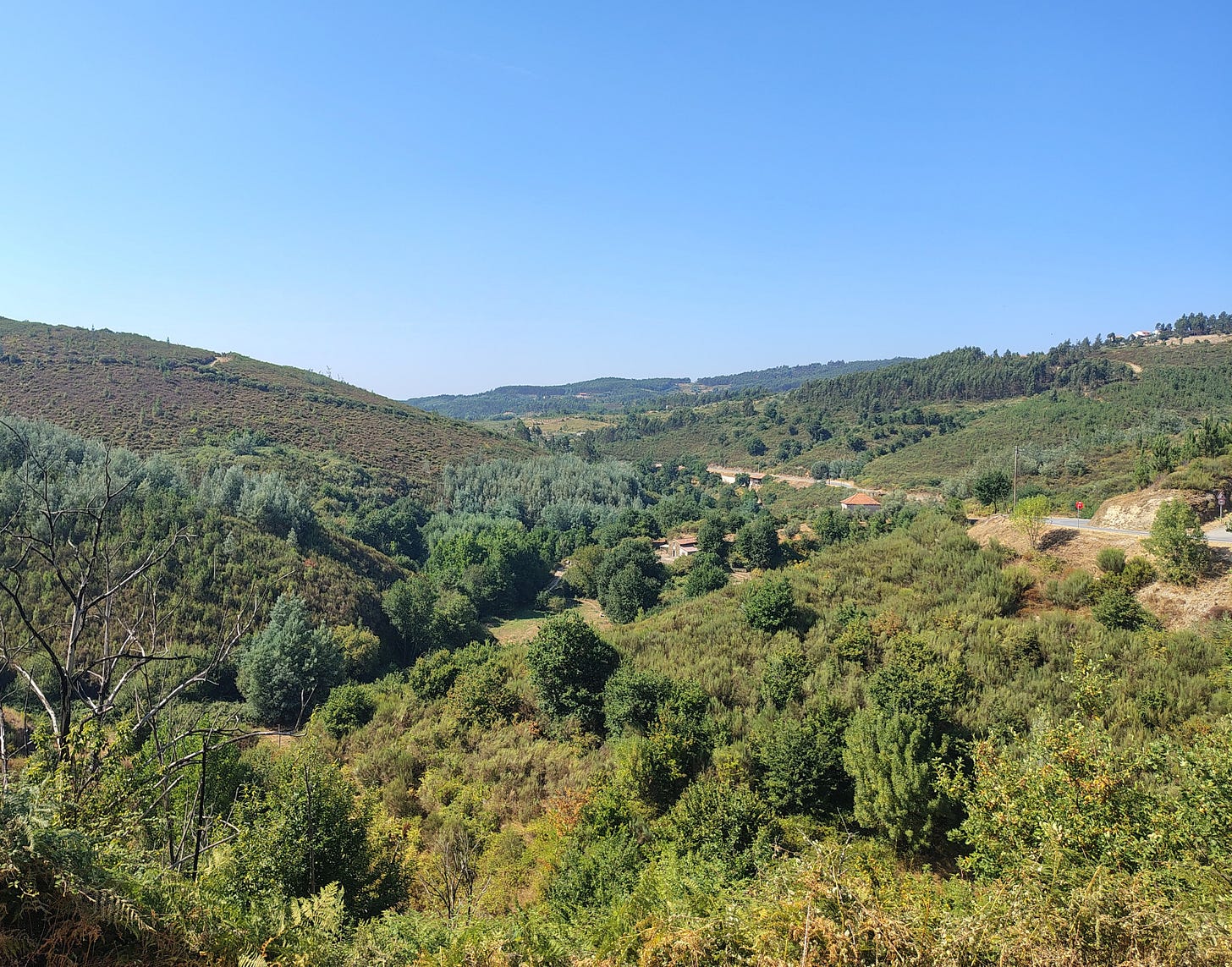
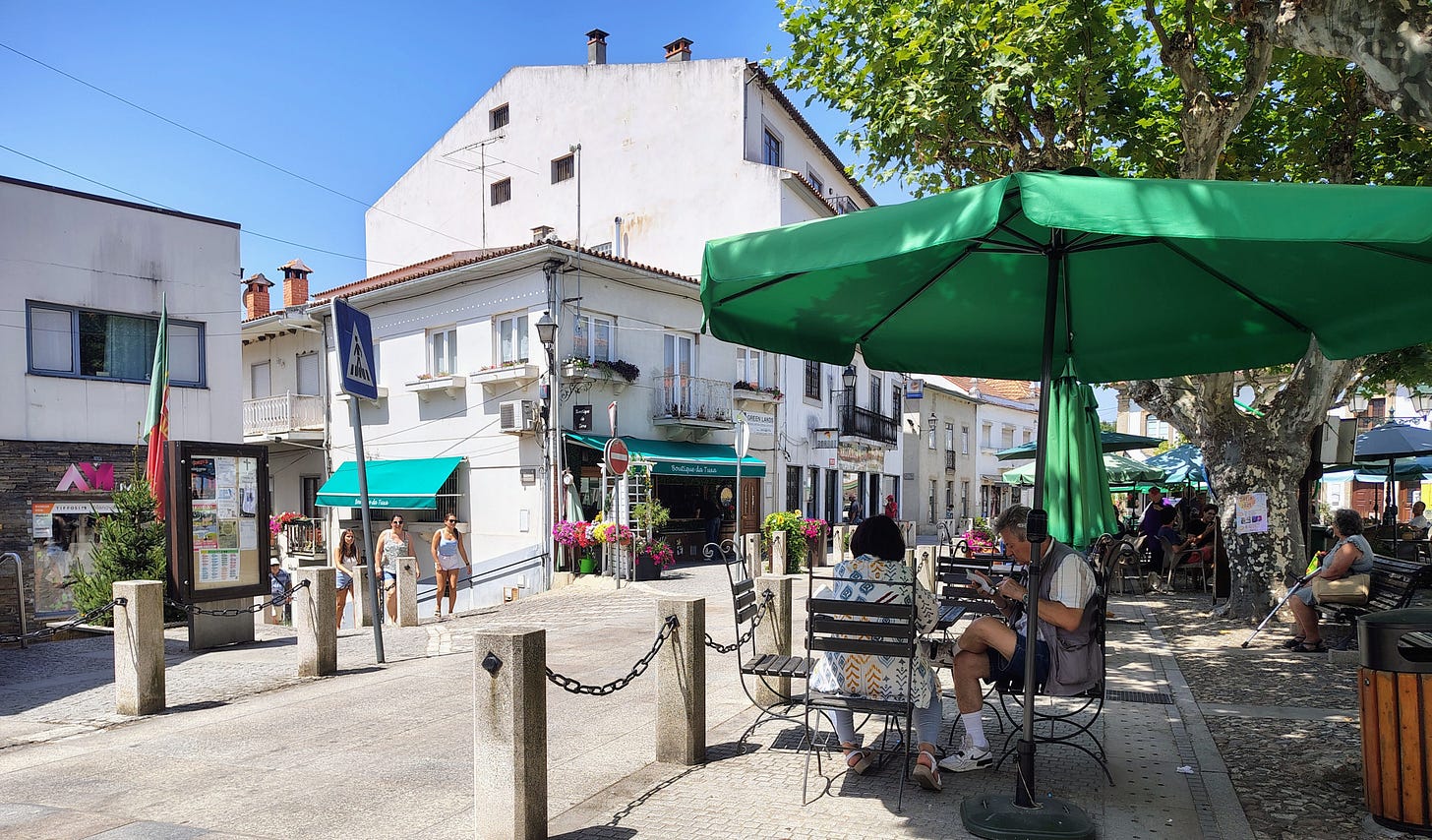
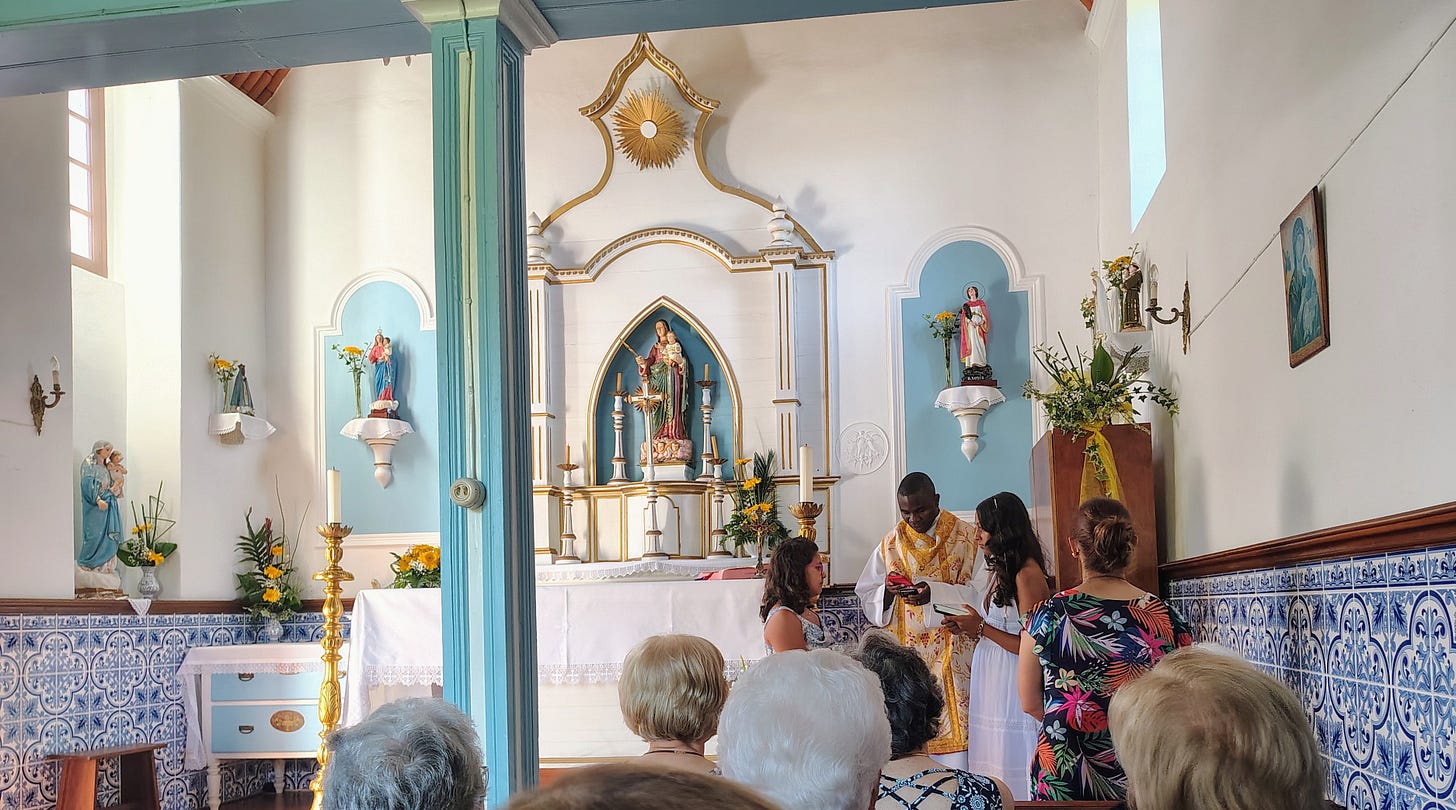
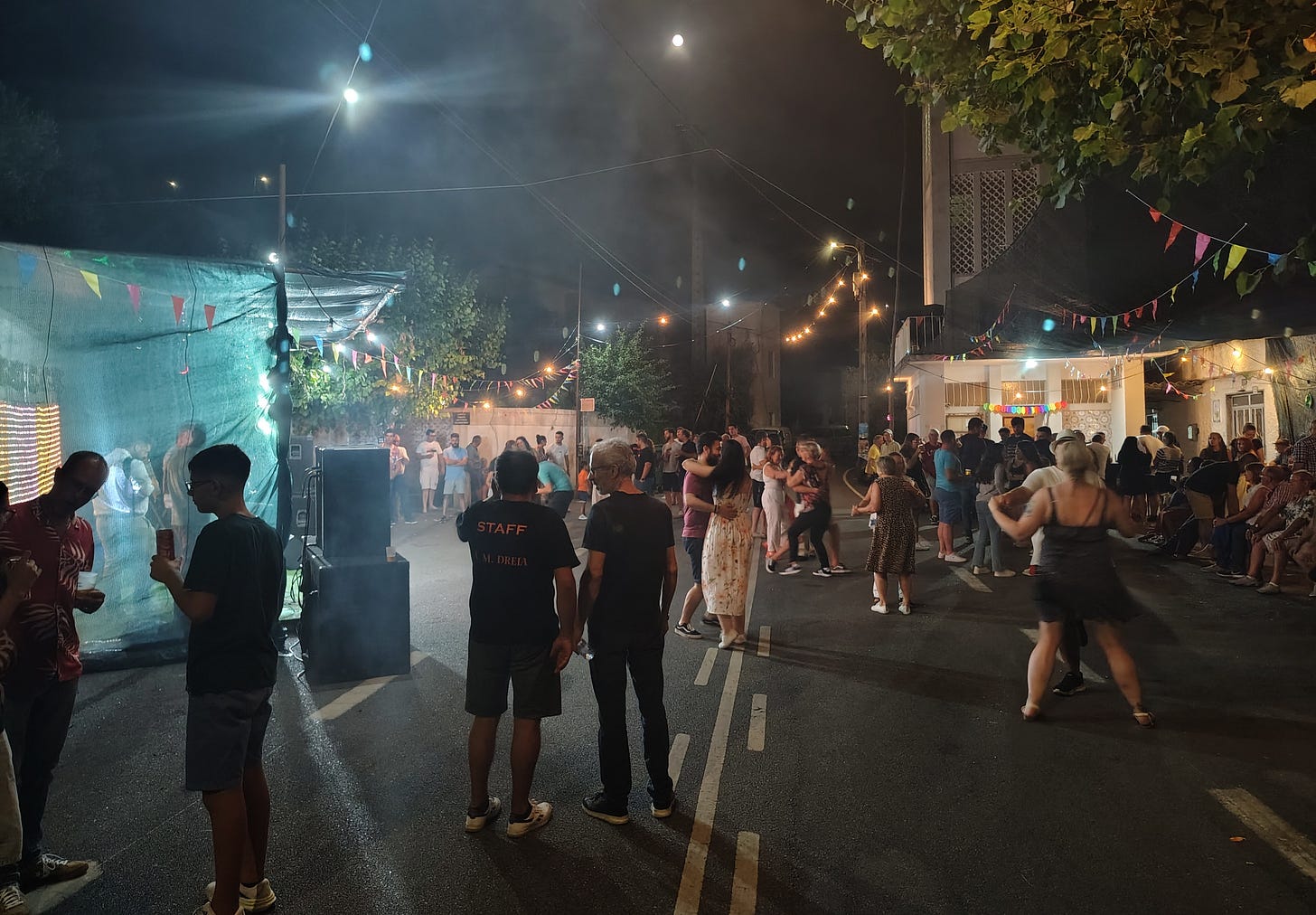
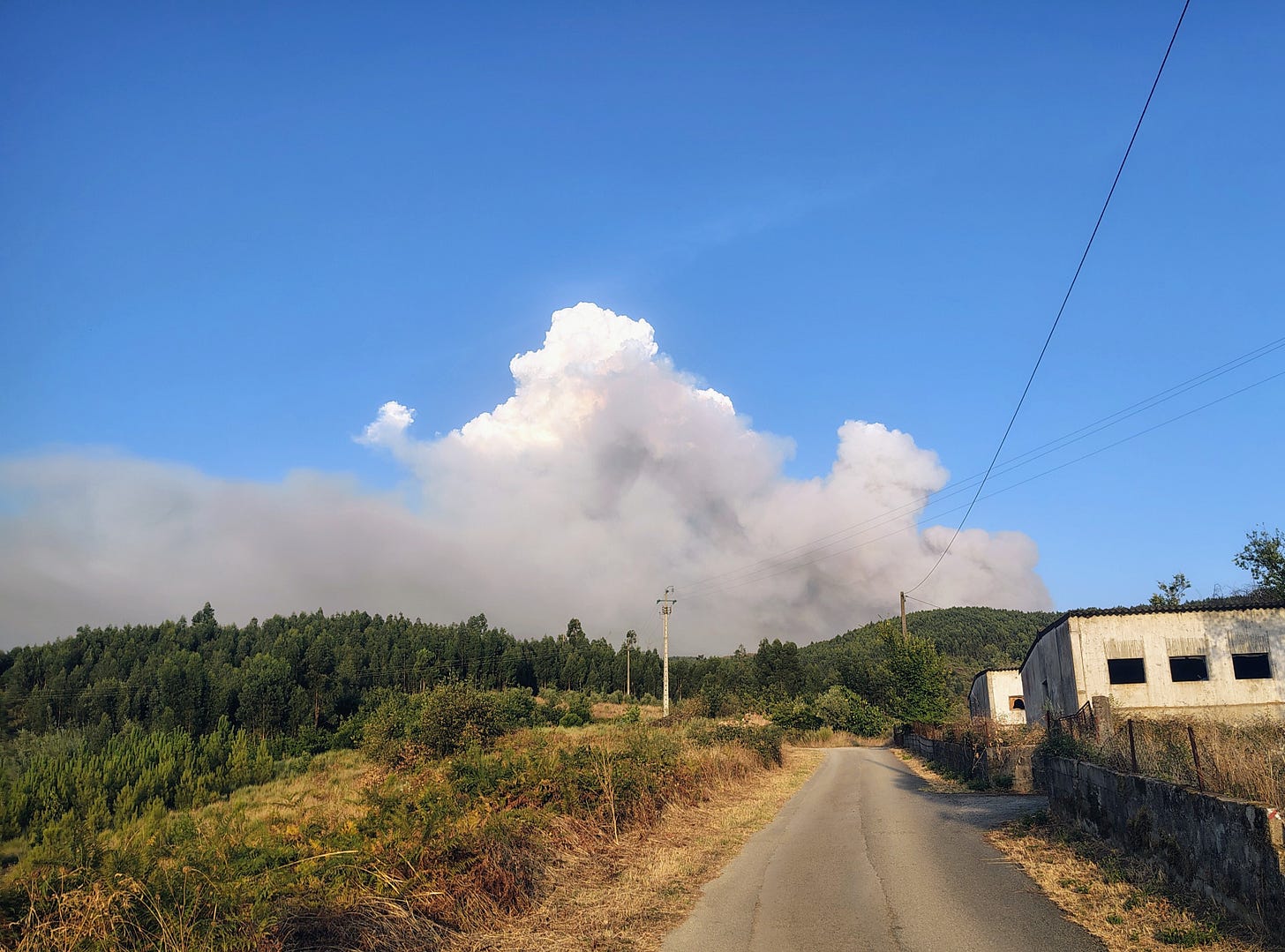
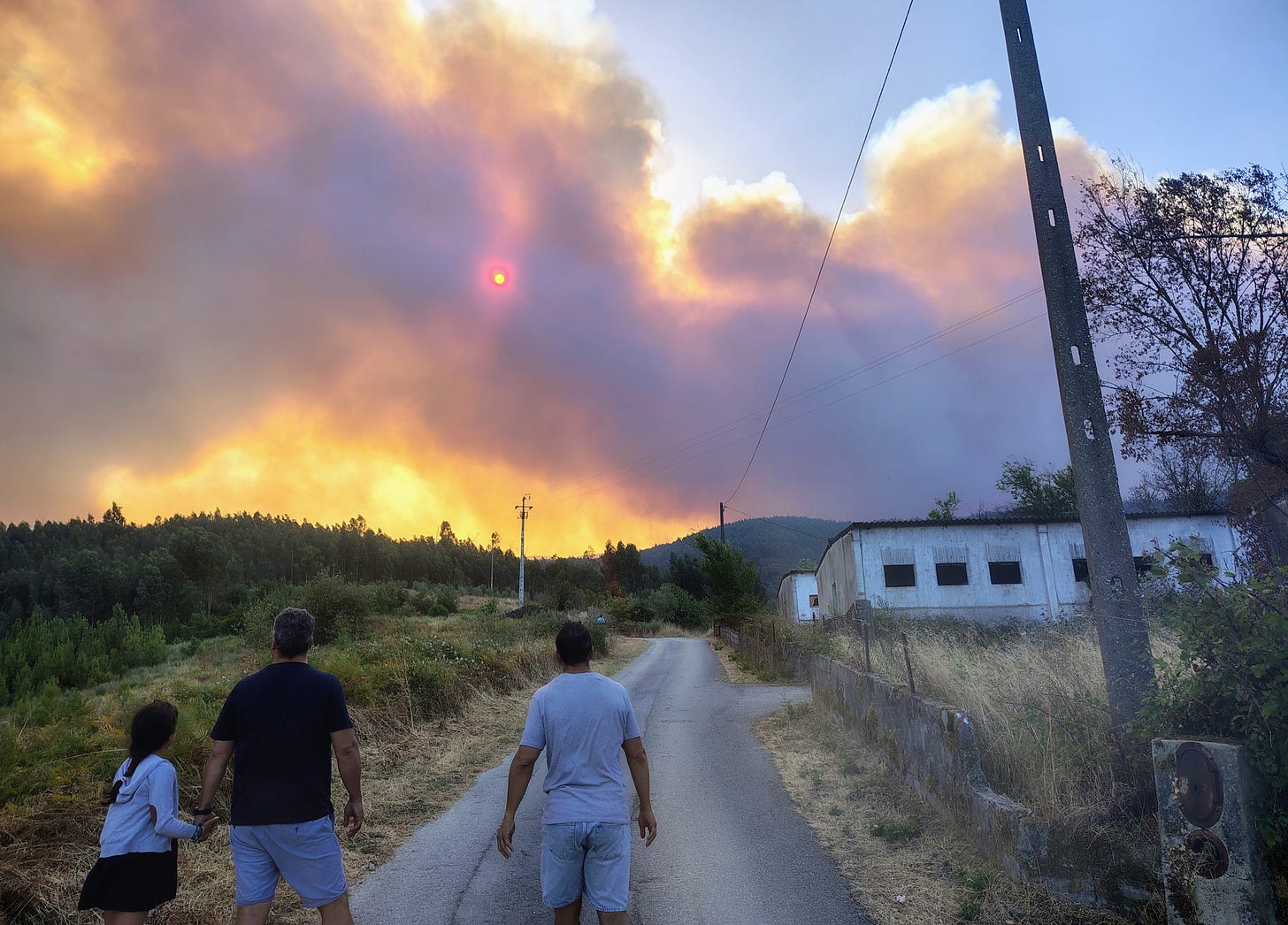
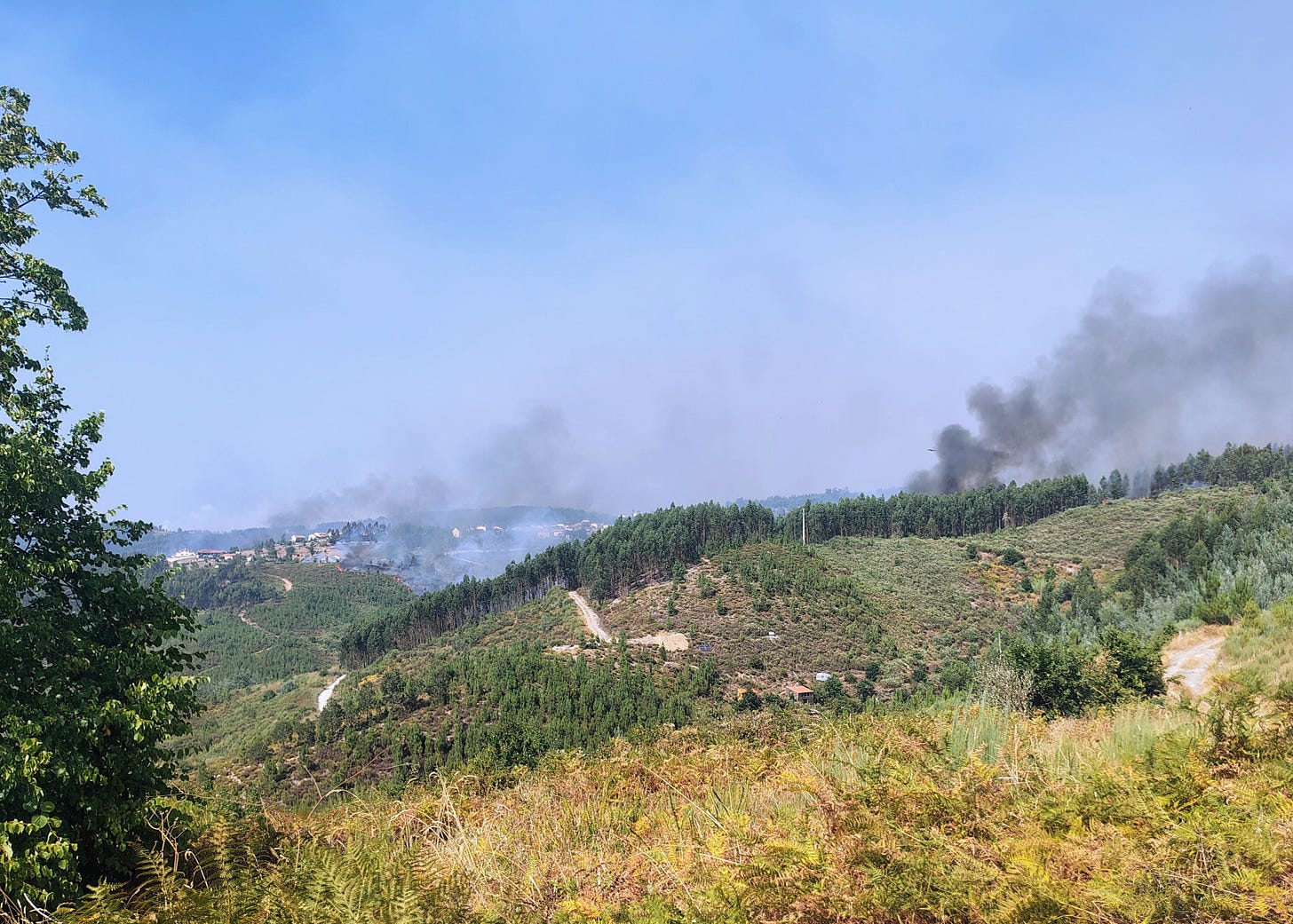
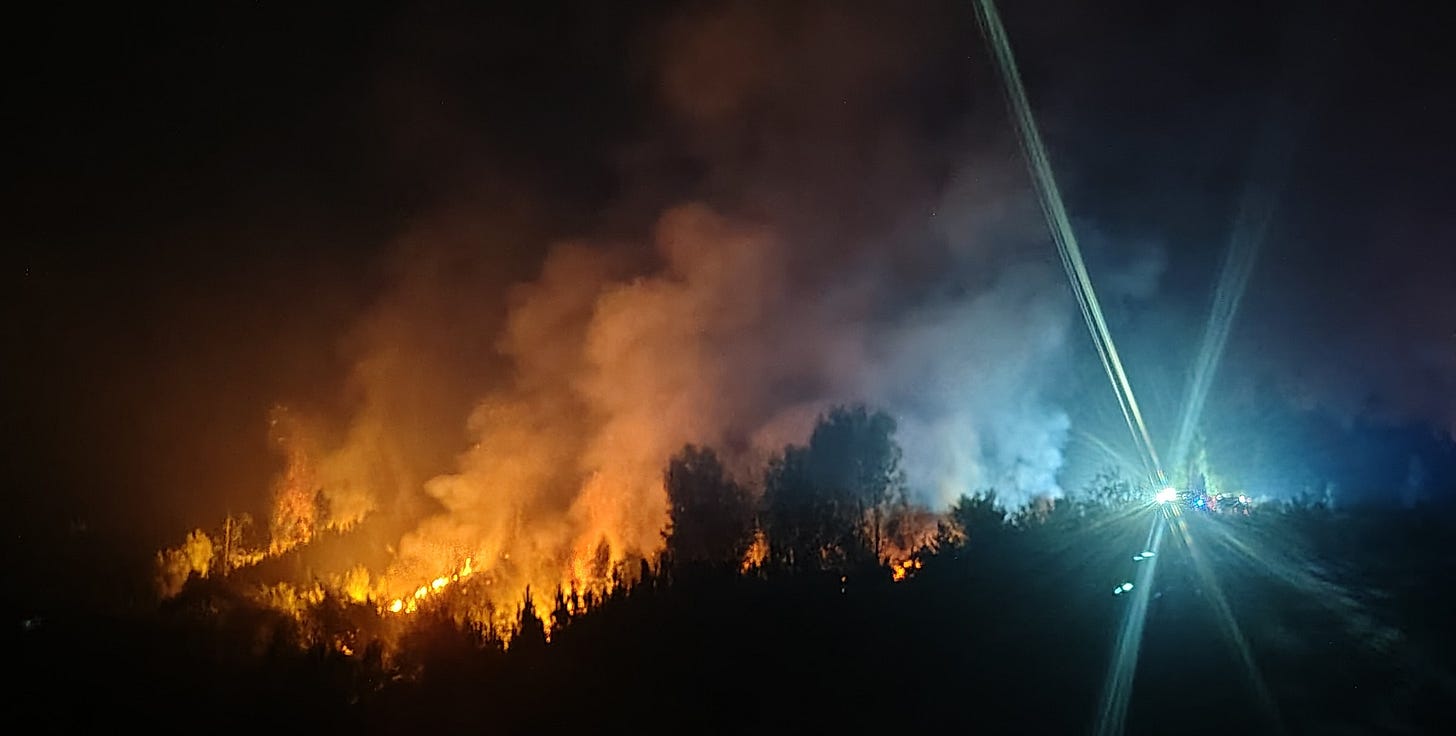
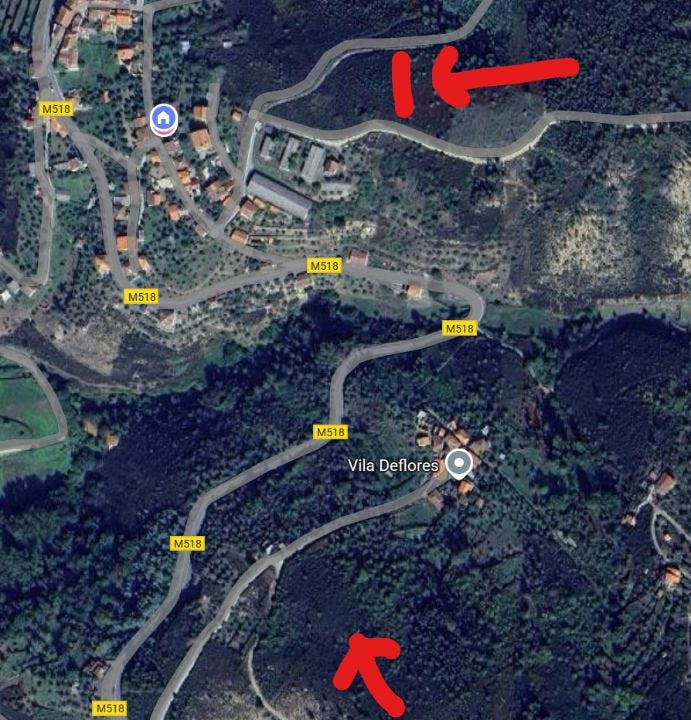
What an amazing story, Alden! Such an adventure you two are on - so excited for you guys and can't wait for the next update! Thanks for sharing your experiences!!! I'm so glad you are finding it to be such a welcoming community! Hugs to you and Cali <3 <3 <3
Sounds like a dramatic start to your life in Portugal. But I love the "we" in the sentences: "In Portugal there is very little wood construction, if any. WE don’t have the lumber industry of North America". It portends well. It sounds like you have wonderful neighbors there to tell you when you're about to step in the glue, etc.